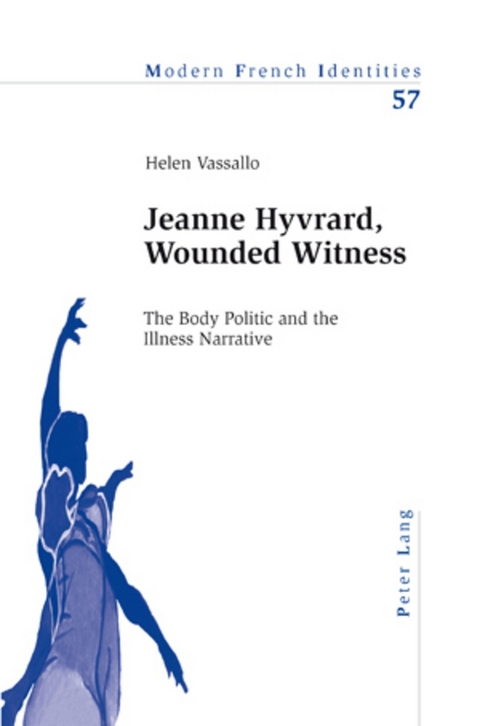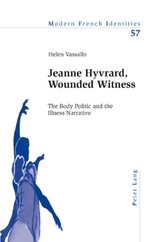Jeanne Hyvrard, Wounded Witness
The Body Politic and the Illness Narrative
2007
Peter Lang Group Ag, International Academic Publishers (Verlag)
978-3-03911-017-9 (ISBN)
Peter Lang Group Ag, International Academic Publishers (Verlag)
978-3-03911-017-9 (ISBN)
Critical responses to Jeanne Hyvrard have generally categorised her as a writer of 'écriture féminine' and/or autobiography, due to salient features of her oeuvre such as the use of first-person narrative, a cyclic writing style, and the quest for a 'female' language. Within these broader considerations, however, a recurrent motif throughout Hyvrard's writing is that of the body, specifically the female body, represented as suffering from different forms of physical/mental illness and emotional/social malaise. It is this primordial aspect of Hyvrard's work, on which surprisingly little critical analysis has been written, that this monograph explores.
It has been demonstrated that Hyvrard's works can be studied as a unity as well as individually, given that all of her texts form part of her wider theory. While this theory is often referred to in abstract terms as 'pensée ronde', 'pensée globale' or 'pensée-femme', this study shows that it can be more specifically highlighted as a theory of dis(-)ease (i.e. the intertwining of physical malady and social malaise, medical terms and metaphor), and, particularly, as a social theory of the dis(-)eased female body.
It has been demonstrated that Hyvrard's works can be studied as a unity as well as individually, given that all of her texts form part of her wider theory. While this theory is often referred to in abstract terms as 'pensée ronde', 'pensée globale' or 'pensée-femme', this study shows that it can be more specifically highlighted as a theory of dis(-)ease (i.e. the intertwining of physical malady and social malaise, medical terms and metaphor), and, particularly, as a social theory of the dis(-)eased female body.
The Author: Helen Vassallo is Lecturer in French at the University of Exeter (UK). In 1999 she graduated from the University of Liverpool with a first class honours degree in French and Hispanic Studies. She then took an M.A. in Literary Translation at the University of Exeter, followed by a Ph.D. in 2004.
Contents: 'Je ne suis ni noire, ni antillaise': Jeanne Hyvrard and the French Literary Tradition - The Metaphors of Dis(-)ease - The (Female or Feminist?) Subject of Dis(-)ease: Representations of Maternal Dis(-)ease - Healing Maternal Dis(-)ease - The Language of Dis(-)ease - Jeanne Hyvrard and Dis(-)ease: A Legacy of Overcoming.
| Erscheint lt. Verlag | 2.5.2007 |
|---|---|
| Reihe/Serie | Modern French Identities ; 57 |
| Verlagsort | Oxford |
| Sprache | englisch |
| Maße | 148 x 210 mm |
| Gewicht | 370 g |
| Themenwelt | Kunst / Musik / Theater |
| Geisteswissenschaften ► Sprach- / Literaturwissenschaft ► Literaturwissenschaft | |
| Geisteswissenschaften ► Sprach- / Literaturwissenschaft ► Romanistik | |
| Sozialwissenschaften ► Soziologie ► Gender Studies | |
| Schlagworte | Body • Collier • Emotional • Frau (Motiv) • Hardcover, Softcover / Romanische Sprachwissenschaft, Literaturwissenschaft • HC/Romanische Sprachwissenschaft, Literaturwissenschaft • Helen • Hyvrard • Hyvrard, Jeanne • Illness • jeann • Jeanne • Körper (Motiv) • Krankheit (Motiv) • narrative • Pensee-Femme • Peter • Politic • Social Malaise • Vassallo • Witness • Wounded |
| ISBN-10 | 3-03911-017-9 / 3039110179 |
| ISBN-13 | 978-3-03911-017-9 / 9783039110179 |
| Zustand | Neuware |
| Haben Sie eine Frage zum Produkt? |
Mehr entdecken
aus dem Bereich
aus dem Bereich
Buch | Softcover (2020)
Beuth (Verlag)
CHF 27,85




